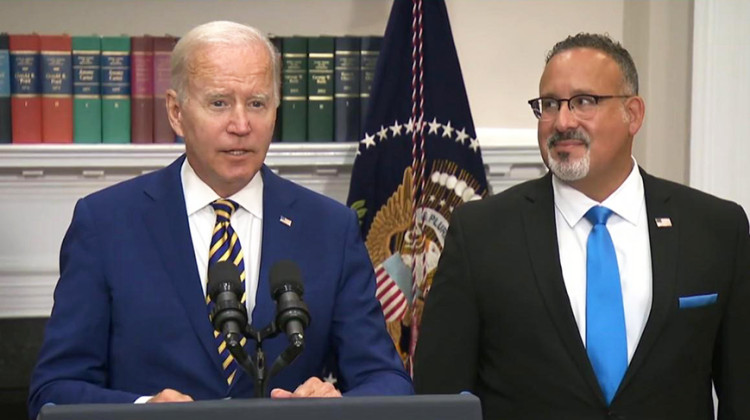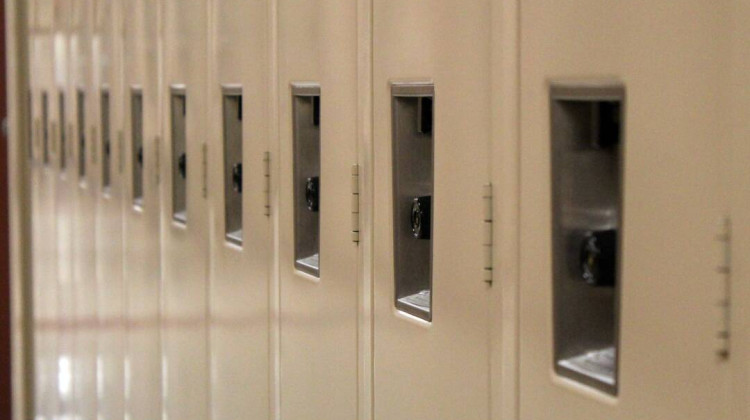
President Joe Biden announced Wednesday his administration would forgive $10,000 of student debt for most borrowers and $20,000 for Pell Grant recipients.
Screenshot of whitehouse.govETHAN SANDWEISS
President Joe Biden announced Wednesday that his administration will cancel $10,000 of federal student debt for each borrower earning less than $125,000. Pell Grant recipients may have as much as $20,000 forgiven, and no borrowers will be required to pay more than 5 percent of their monthly income.
Tune in as I deliver remarks on my plan to bring student loan debt relief to the millions of borrowers who need it the most. https://t.co/aZCrbeOH7k
— President Biden (@POTUS) August 24, 2022
Biden pledged on the campaign trail to forgive all undergraduate student debt at public, historically black, and minority serving universities and colleges. His current plan falls short of that promise, but it still represents an unprecedented move. How will this decision affect borrowers in Indiana?
Americans currently owe $1.6 trillion in federal student loan debt - almost 8% of the national gross domestic product. Over 48 million Americans are currently paying off student loans averaging $28,950 per borrower. Indiana ranks above the national average at $32,874, and, according to the U.S. News and World Report, IU Bloomington graduates can expect to borrow an average $19,500 in federal loans.
Phil Schuman counsels IU students on finances and loans as Executive Director of Financial Wellness and Education. He said that Biden’s debt plan could be especially impactful for low-income borrowers.
“For every $10,000 in student loans that you have under a 10-year repayment plan, that’s taking off $100 a month from your payments,” Schuman said. “It may have been difficult for people to survive over the last few years. Maybe that $100 isn’t going to get them over that hump, but it’s going to go a long way. It could just help them get back on steady footing.”
Public pressure has been growing for years on the federal government to intervene in the student debt crisis. IU Sociology professor and author Brian Powell has studied public attitudes toward paying for higher education for over a decade.
“What we find is a dramatic shift from 2010 through that whole decade in which people now see the government as being a major player or at least a key partner in handling the financial responsibility of college,” Powell said.
Powell’s research revealed that the public sees college degrees as increasingly necessary, but increasingly unaffordable. Participants surveyed in 2015 and 2020 were also far more likely to mention debt as a factor in their thinking than participants in 2010. Powell also said the passage of the Affordable Care Act in 2010 convinced many Americans that the state should be involved in keeping other essential services affordable.
Fiscal conservatives have criticized Biden’s plan for the potential impact increasing household income could have on inflation. Inflation in the U.S. stands around 8.5%, and the federal government is fighting to bring it down through changing tax codes and lowering health care costs.
Powell acknowledges that inflation could be a side effect of the new plan, but he can’t say for certain. Nevertheless, he encouraged people to consider the plan as a cost-benefit analysis rather than a zero-sum game.
“Let’s suppose for a moment that it is inflationary,” Powell said. “You still have to compare the benefit of providing forgiveness versus the potential for inflation.”
Some critics say that $10,000 isn’t enough to bring those needed benefits, especially for marginalized communities. Research from the Brookings Institute shows that Black graduates hold an average $53,000 in debt four years after graduation - almost double the amount of White graduates. Black women in particular are almost three times as likely to have student debt as White men. In a CNN op-ed, NAACP President Derrick Johnson described Biden’s plan as “pouring a bucket of ice water on a forest fire.” U.S. Senators Chuck Schumer and Elizabeth Warren urged the president to forgive $50,000 instead.
IU alumnus, former Student Government President and former President of IU Black Student Union Ky Freeman said that during his tenure in both positions, he saw other students from marginalized backgrounds face financial challenges that jeopardized their entire education.
“Some of our students didn’t make it back after a semester because of how expensive college got, and they’d already procured enough loans that they couldn’t get any more,” Freeman said.
Discussions from the Black Student Union informed Freeman’s approach to governing the student body, including advocating for loan forgiveness in D.C., and pressing university administrators to distribute more Pell Grants.
“When you’re talking about those types of financial hardships that come from our intersecting identities playing out, as Black students we don’t get to come and just be students at university,” Freeman said.
Regardless of its impact for certain students, Powell cautioned Americans not to think of one-time debt forgiveness as a permanent solution for the rising cost of education.
“Loan forgiveness is just one part of the discussion about college affordability.” He said. “And it’s just one part of the discussion about what role should the government play in terms of college costs and making colleges affordable.”
 DONATE
DONATE






 Support WFYI. We can't do it without you.
Support WFYI. We can't do it without you.